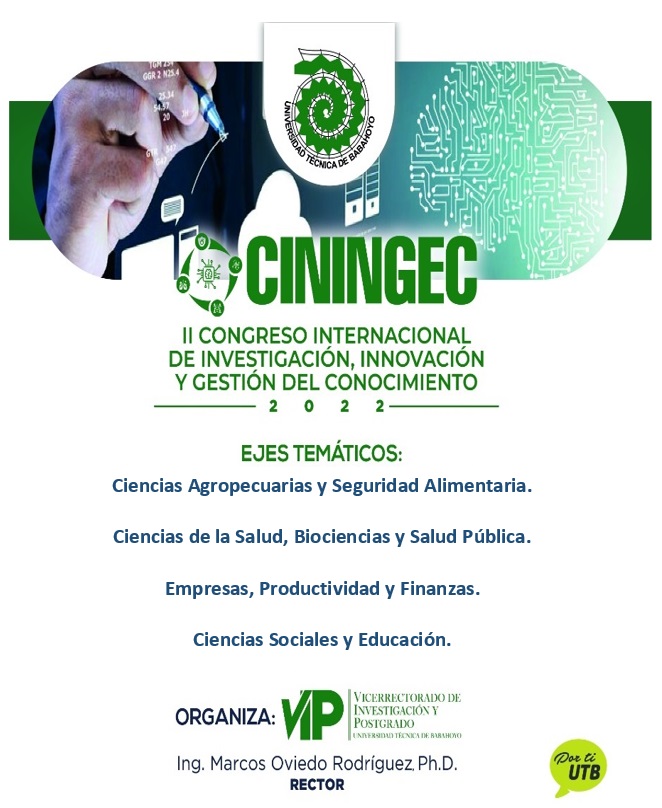Los cambios curriculares que impone la cuarta revolución industrial en la formación de ingenieros
Palabras clave:
Revolución industrial, enseñanza en ingeniería, habilidades de los ingenierosResumen
Las revoluciones científicas y tecnológicas no solo han cambiado la forma de vivir y actuar del hombre, sino que han influenciado sustancialmente en la manera de educar y formar los ingenieros del futuro. La cuarta revolución industrial impulsada por la inteligencia artificial no solo ha cambiado los métodos y contenidos del currículo del ingeniero sino también las habilidades y destrezas que debe tener para resolver problemas tan complejos que la sociedad moderna exige.
Descargas
Citas
World Economic Forum, Towards a Reskilling Revolution: A Future of Jobs for All, 2018.
Balliester, Thereza and Adam Elsheikhi, The Future of Work: A Literature Review, ILO Research Department Working Paper No. 29, International Labour Organization, 2018.
Mitchell, Tom and Erik Brynjolfsson, “Track how technology is transforming work,” Nature, vol. 544, no. 7650, 2017.
Chang, Jae-Hee and Phu Huynh, ASEAN in Transformation: The Future of Jobs at Risk of Automation, International Labour Office Bureau for Employers’ Activities Working Paper No. 9, International Labour Office, 2016.
DeCanio, Stephen, “Robots and humans – complements or substitutes?”, Journal of Macroeconomics, vol. 49, 2016, pp. 280–291.
Deming, David and Lisa B. Kahn, “Skill Requirements across Firms and Labor Markets: Evidence from Job Postings for Professionals”, Journal of Labor Economics, vol. 36, no. S1, 2018, pp. S337–S369
Rubbi, L., Barlaro Rovati, B. y Petraglia, A. (2020). Perdidos o salvados? El pp. 307-276
E Graue, J Martuscelli, C martínez Leyva. Educación superior, el futuro del trabajo y la automatización. Universidades · UDUAL · México · núm. 81 · julio-septiembre 2019. pp65-74
R Prado, A Nayeli1 , Torres-Mansur, S Maribel2 , P-Salinas, S Imelda3, ¿Cómo reinvertarse para ser competitivos en la Industria 4.0? Palermo Business Review.1 83-198.
G Mendizábal Bermúdez, A .E Escalante Ferrer. The challenge of education 4.0: labour skills for emerging work by covid-19. Revista Latinoamericana de Ciencias Sociales y Humanisticas. Vol. 10, Núm. 19 Enero – Junio 2021.
V G López Torres, D A Pérez Rivas y O Galván Mendoza. The labor market in the context of the fourth industrial revolution, worker profile administrative sciences professional: skills and abilities. Gestion y Estrategia. N 57. Enero-Junio 2020.pp 39-52
L. L LAURENT MARTÍNEZ, J. LOZA LÓPEZ y L. PONCE GARCÍA. Las nuevas profesiones y el mercado laboral. Red Internacional de Investigadores en Competitividad Memoria del VIII Congreso ISBN 978-607-96203-0-3.
René Pedroza Flores. La universidad 4.0 con currículo inteligente 1.0 en la cuarta revolución industrial. Revista Iberoamericana para la Investigación y el Desarrollo Educativo. Vol. 9, Núm. 17. Julio - Diciembre 2018 .DOI: 10.23913/ride.v9i17.377
F E Rojas Navarrete, N Y Rodríguez Cabrera. IN DUSTRY 4.0 OUTLOOK WITHIN THE PROFESSIONAL FORMATION FRAMEWORK OF H UMAN TALENT IN HEALT. Revista de Investigación e Innovación en Salud. Diciembre 2018. N7,pp 67-89.
V Giudice Baca, O Haquehua Rimachi. Nuevas profesiones universitarias Siglo xxi. Pensamiento Crítico Vol. 19 N° 2, pp. 137-149.
A L Arenas Landinez y D C Ramírez Prada. Visión Prospectiva de la Formación en Ingeniería. 8 th Latin American and Caribbean Conference for Engineering and Technology. June 1-4, 2010.
E Fracchila y M Calveira. Impacto de la cuarta revolución industrial en el empleo y en la distribución del ingreso. ISSN 1852-0022 / ISBN 978-987-28590-8-4. LV REUNIÓN ANUAL| NOVIEMBRE DE 2020.
Winner, Langdon, “Las tecnologías como formas de vida”, en La Ballena y el Reactor, Gedisa Editoria, Barcelona, España, 1986, p. 32.
Bevins, F., Bryant, J., Krishnan, C. y Law, J. (2020). Coronavirus: How should US higher education plan for an uncertain future? McKinsey.
Brown, C. y Salmi, J. (8 de abril de 2020). Readying for the future: COVID-19, Higher Ed, and Fairness. Medium.
Brunner, J. y Labraña, J. (2020). The transformation of higher education in Latin America: From elite access to massification and universalization. En S. Schwartzman (Ed.), Latin American Higher Education (pp. 21-41). Springer Publishing.
Gleason, N. W. (2018). Higher Education in the Era of the Fourth Industrial Revolution. Springer Singapore.
Jung, J. (2020). The fourth industrial revolution, knowledge production and higher education in South Korea. Journal of Higher Education Policy and Management, 42(2), 134-156.
Venkatraman, S., Souza-Daw, T. y Kaspi, S. (2018). Improving employment outcomes of career and technical educational students. Higher Education, Skills and WorkBased Learning, 8(4), 469-483.
Descargas
Publicado
Cómo citar
Número
Sección
Licencia
Derechos de autor 2022 Journal of Science and Research

Esta obra está bajo una licencia internacional Creative Commons Atribución-NoComercial-SinDerivadas 4.0.
Los autores mantienen los derechos sobre los artículos y por tanto son libres de compartir, copiar, distribuir, ejecutar y comunicar públicamente la obra bajo las condiciones siguientes:
Reconocer los créditos de la obra de la manera especificada por el autor o el licenciante (pero no de una manera que sugiera que tiene su apoyo o que apoyan el uso que hace de su obra).
No utilizar esta obra para fines comerciales.
Declaración de privacidad
Los nombres y direcciones de correo-e introducidos en esta revista se usarán exclusivamente para los fines declarados por esta revista y no estarán disponibles para ningún otro propósito u otra persona.

